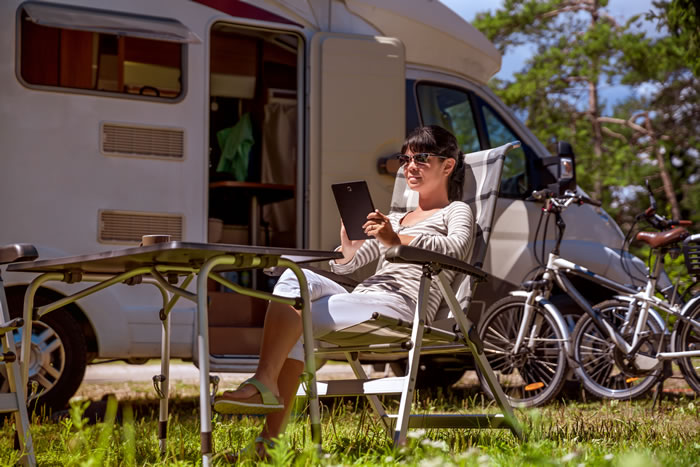
Having a stable, reliable, and ideally speedy way to access the internet is a near essential part of modern life, and that’s the case not just in houses and offices, but also caravans and motorhomes.
Of course, caravans and motorhomes can prove more challenging to bring a connection to, thanks to their mobile nature, which means fibre broadband – the most typical type of home internet – doesn’t tend to be a practical option.
There are lots of other options though, and you’ll find an overview of the various possible Wi-Fi solutions below.
4G or 5G home broadband
| Pros | Cons |
|---|---|
| High speed | Relies on coverage |
| Loads of simultaneous connections | Needs power |
| Affordable | |
| Short term contracts |
If your caravan or motorhome is somewhere with 4G or 5G coverage, then your best option for Wi-Fi is likely to be 4G or 5G home broadband.
This is offered by some mobile networks such as Three, EE, and Vodafone, along with specialist providers like National Broadband, and it allows you to get your gadgets online over a 4G or 5G connection.
You simply sign up for a plan, get sent a router, and then plug that in. It then beams out a Wi-Fi network, leveraging those mobile signals.
This is quick and easy to get up and running, as these devices are designed to be plug and play, and you can often get short term contracts, which is ideal if you’re not staying in your caravan or motorhome all year round.
If you have a 5G signal then speeds can also be exceptionally high, topping many fibre broadband connections. Plus, if you move to a new site you can simply plug your router in there and instantly have internet again. You can also get everything online this way, with most of these routers supporting up to 64 simultaneous connections.
However, this all depends on your mobile coverage. If you can’t get a 4G or 5G signal – which can sometimes be an issue in the rural areas that are often home to caravans and motorhomes – then 5G and 4G home broadband may not be an option for you.
That said, you can always get an external antenna, allowing your broadband to lock on to signals that a phone might not pick up, so even if you don’t think you have 4G or 5G coverage, it’s worth investigating.
The only other downside of this solution is that it needs plugging in, so ideally you’ll need to have access to a mains electricity supply.
4G or 5G mobile broadband
| Pros | Cons |
|---|---|
| Great speeds | Relies on coverage |
| Affordable | Fewer simultaneous connections |
| Short term contracts | |
| Battery powered |
4G and 5G mobile broadband is a lot like 4G and 5G home broadband, except you get a battery powered router rather than something that needs plugging in.
That makes it more versatile, and a better option while on the road, but typically mobile broadband routers support fewer connections simultaneously, and they’re not designed to be permanently switched on like home broadband is.
So if you’re mostly at a site with mains power, we’d still go for 4G or 5G home broadband. But if not, then you can get the likes of Three mobile broadband, O2 mobile broadband, Vodafone mobile broadband, or EE mobile broadband.
You can also get dongles, which plug directly into a device’s USB port to provide mobile internet access to it. These don’t have their own battery, instead being powered by your laptop or other device. But they can only get one device online at once, and for the most part only work with computers.
Tethering
| Pros | Cons |
|---|---|
| No extra cost or hardware | Relies on coverage |
| Decent speeds | Uses up phone battery fast |
| Very limited simultaneous connections | |
| Relies on your phone's data limit |
Tethering essentially provides mobile broadband without needing to sign up for a new plan or get a router, as it turns your phone into the router.
This feature – also known as a personal hotspot – can be turned on from the settings screen of most smartphones, and allows you to broadcast a Wi-Fi network, using your phone’s signal and data.
If you only need occasional Wi-Fi then this can be ideal, but it’s not great for frequent or constant use. For one thing, it will quickly use up your phone’s battery if you don’t leave your handset plugged in. It will also rapidly consume your phone’s data allowance if you don’t have a very high or unlimited data plan.
Plus, you can’t typically connect as many devices at once when tethering as with 4G or 5G home or mobile broadband, and some mobile networks have fair usage limits for simultaneous connections. As with other Wi-Fi that relies on 4G or 5G, you’ll also need coverage for it to work.
Site Wi-Fi
| Pros | Cons |
|---|---|
| A simple solution | Often slow and restrictive |
| No reliance on mobile coverage | May need a Wi-Fi booster |
Many caravan sites provide their own Wi-Fi services, which for an extra fee allow you to get online without any additional plans or hardware, and there’s no reliance on mobile coverage.
However, these on-site Wi-Fi services can often be slow and unreliable, and your speeds or data use may be limited, especially at peak times when lots of people on the site are trying to use it.
Depending on how far your caravan or motorhome is from the router, you may also need a Wi-Fi signal booster to connect, such as the Kuma My WiFi Hotspot Booster Kit, which is designed specifically for caravans, motorhomes, boats, and gardens. You just plug this in at your caravan, and connect it to the site’s Wi-Fi network.
Of course, by the time you’ve paid for that and the site’s Wi-Fi fees, you might as well have just got 4G or 5G broadband, which will typically be faster and work without restrictions.
On-site Wi-Fi also isn’t ideal if you’re often moving between different sites, as you’re likely to have to pay again at each.
Still, for light use (such as social media and email) at a single site, it’s a solid solution.
Satellite
| Pros | Cons |
|---|---|
| Works just about everywhere | Expensive |
| Less simple to set up than other options | |
| Unreliable |
One final option is satellite internet. This can provide your caravan or motorhome with Wi-Fi even if there’s no mobile signal available, and no on-site Wi-Fi. But in general that’s the only circumstance where you’d probably want to use this, and that’s an extremely unlikely situation unless you’ve parked up somewhere very remote.
Satellite Wi-Fi means attaching a satellite dish to your vehicle, and then as long as there’s a clear line of sight to the sky, you should be able to get an internet connection.
However, this is typically the most expensive option and the most involved in terms of the setup required. Not only do you need a satellite dish, but also a satellite router and modem, and a satellite internet plan – which itself can be quite expensive, and often comes with restrictive data limits.
Many satellite solutions also aren’t ideal for anything other than a static caravan, as the satellite dish will need realigning when you move (though you can get fully automatic systems that align with satellites on their own).
Cost and hassle aside, there are other downsides to satellite Wi-Fi, including unreliability, as clouds and bad weather can affect their performance, and speeds, as this will typically be a lot slower than 5G broadband, and somewhat slower even than 4G.












